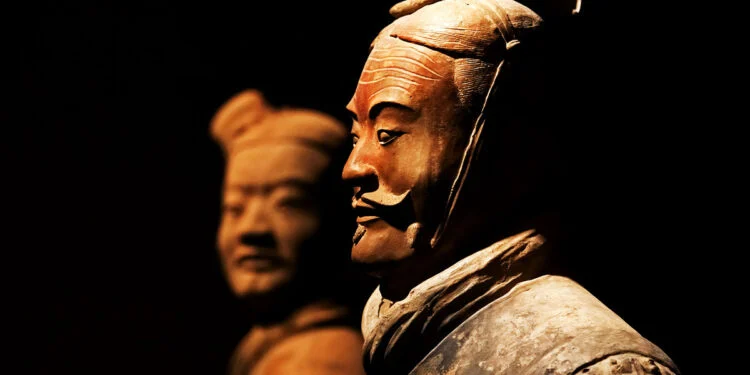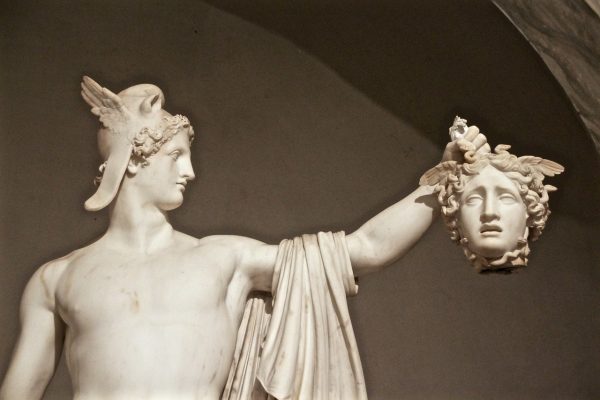Little is known with certainty about this author. It is most likely that he is a strategist, in the sense given by the Greeks, a leader of armies, a general, who lived in China five hundred years before Jesus Christ.
Under the name of Sun Tzu Wu hides one of the best strategic thinkers of all time. Little is known with certainty about the author of The Art of War. It is most likely that he was a strategist, in the sense given to him by the Greeks, a leader of armies, a general, who lived in China five hundred years before Jesus Christ and who wrote the Bing Fa, translated as The Art of War. However, there are also those who doubt the real existence of the character, who could well be a legend that took advantage of the authentic author or authors of the book, in order to give greater credibility and dissemination to his writings.
The most plausible hypothesis is that given the coherence, uniformity and depth of thought of the thirteen chapters of the book, they were written by a single person, whose knowledge of strategy, understood as a tool for achieving political or military objectives, was profound, and whose capacity for reflection on human behavior in the face of conflict was exceptional. In any case, it was probably written in China during the time of the Warring Kingdoms (481-221 B.C.).
It is a short book, easy to read but with the characteristic that each paragraph incites the reader’s reflection, who will surely feel tempted to transfer the text he has just read to his own life experience in different fields.
The work is a set of aphorisms commented by other Chinese authors who expand and explain the texts of the “master”. His sentences are a continuous reflection on the conflict between human beings, capable of using war to resolve their disputes. Sun Tzu’s reflections enjoy a high degree of abstraction and conceptualization that make The Art of War a classic text, useful for the resolution of crises in the field of international, commercial and even personal relations. Wherever there is a clash of interests between human beings, Sun Tzu’s aphorisms are useful.
The honor of the discovery of the book for the West belongs to the French Jesuit Joseph Marie Amiot, who translated and published it in Paris in 1776. Its diffusion is due to the Englishman Herbert Allen Giles who, at the end of the 19th century, after his posting as a diplomat in China and being professor of Chinese language in Cambridge, translated the Bing Fa into English, achieving great notoriety for the work.
The Art of War: A Reference Book
This is a reference book in military and mercantile circles in China and Japan and required reading in most staff colleges in almost all Western countries. Perhaps it is as Thomas Cleary says in his preface that “the book continues to have value in our time because of the way in which power is continually moderated by a deep undercurrent of humanism. It is not only a book about war but also a book about peace and, above all, a tool for understanding the true roots of conflict and its resolution.”
Sun Tzu is a master in the management and conduct of crises, with the permanent objective of avoiding the escalation of the conflict, always trying to achieve victory without fighting, something always desirable, at least in the present times. He speaks of victory without actually fighting; it is a matter of pursuing peace over and above the interest in military victory.
Strategy is the focus of most of his thirteen chapters, but not the traditional strategy that is confined to war. Sun Tzu’s strategy is the strategy of the 21st century, which leaves the realm of war to be applied in politics, where crises are managed.
The author reflects on the considerations prior to decision-making or, as it is called in the edition we have taken as a reference: the strategic criteria. He establishes five elements for assessing the situation: the path, the climate, the terrain, the leader and the discipline.
The path is the single objective, common between the people and the rulers. In this the Chinese master coincides with another distinguished strategist, Carl von Clausewitz (1780-1831) who established the three essential elements of war that must have a common objective. Clausewitz spoke of a passionate element, which is the people; a rational element, which is the government; and a volitional element, which is its armies. They are the “three legs of the table” that must be at the same level so that it does not fall. Although Sun Tzu says nothing about the third element, he does make it clear, coinciding with Clausewitz’s theories and with current trends, that the armed forces must be subject to political power. Armies pursue the objectives set by their rulers.
Leadership
Undoubtedly, elements such as terrain and, above all, climate have lost some of their prominence due to the new technological capabilities of armies. Leadership, however, remains a key factor in assessing the situation. As for the fifth element, discipline, Sun Tzu includes organization, command structure and logistics.
Today, any crisis situation requires a study of the following factors: the geographical setting, the human factor, the economic factor, the socio-political factor and, finally, the military factor. The differences with what the master advocates are fundamentally in the economic and socio-political sphere, due to the importance and complexity that the economy and the structures of societies, States and international organizations have acquired in a globalized world, where conflicts are no longer limited to the clash of interests between neighboring countries.
Machiavelli, in his Art of War written in 1521, says that “the aim of war is to subjugate the enemy to one’s own will”. This theory is also shared by Clausewitz and, roughly speaking, it is also the idea of Sun Tzu, who gives priority to breaking the enemy’s will before combat and says: “Discourage them [the enemy] with the prospect of your victory, surprise them by confusion”.
What is Sun Tzu’s preferred strategy? While Clausewitz advocates the action of the strong on the strong, that is, the application of the main effort of the bulk of our forces on the enemy’s strong points, thus seeking decisive action, as he had seen Napoleon act, Sun Tzu, on the other hand, is in favor of hitting the weak points, attacking when the enemy is unprepared.
He is an enthusiast of deception and surprise. This is what Liddell Hart, a British strategist who was negatively impressed by the consequences of the application of Clausewitz’s theories by Marshal Foch, head of the Allied forces, and by General Moltke, chief of the German General Staff, in World War I, also proposes.
The strategy of the Chinese master is what Liddell Hart calls “indirect strategy”, consisting of unbalancing the enemy through physical or moral dislocation by acting on his weak points and avoiding the strong ones.
The general rule for the use of military means, according to Sun Tzu, is based on keeping the enemy country intact rather than destroying it. This strategy is in full force and effect. In recent conflicts, efforts have been made to achieve the surrender of the enemy, without causing civilian casualties and with the least possible damage to the structure of society, in the knowledge that the victor will have to contribute to reconstruction. The strategies advocated by the master lead to the so-called psychological and information operations that are today an important part of military action; that is, to damage the psychological and moral resistance of the adversary in order to win even without fighting.
Since the end of the Second World War, nuclear deterrence has prevented the escalation of crises between the great powers during the so-called Cold War, but it has not been able to prevent the multitude of regional conflicts of a limited nature, which have found in indirect strategy the best way to confront the enemy in asymmetrical wars due to the inequality between the military potential of the contenders.
The Vietnam War was a good example of this strategy used by Ho Chi Minh. The latest example is the September 11 attacks on the Twin Towers and the Pentagon. Terrorists attacked the United States, creating a sense of insecurity in their own territory, by attacking the civilian population using their own means, American commercial airplanes, and taking advantage of the weaknesses of a security system based on freedoms.
One of Sun Tzu’s main disciples was undoubtedly Mao Zedong, a master of revolutionary strategy, and a proponent of advancing in the face of the enemy’s retreat and retreating in the face of his advance. This is what the founder of the People’s Republic of China defined as the strategy of one against five and the tactic of five against one. According to this way of thinking, it is necessary to develop actions of a strategic nature when one is at a disadvantage and to put tactics into practice, entering into combat when one has superiority. All this has meant that Sun Tzu’s theories are still very popular. In his work one can read: “If your forces are inferior, stand aside, if you can. If you are inferior in numbers, flee if you can”.
Sun Tzu gives great importance to the role of the leader in conflict management, who must act with total coolness. Taoism is the tool he uses to be able to act with great coolness in situations of extreme tension. There are many calls from the author not to act under anger or rage and, on the contrary, the interest in the adversary to be the one to make his decisions away from the necessary calmness that allows to analyze the situation without passion.
Sun Tzu also emphasizes planning before battle, and says that those who plan have more strategic factors on their side. He knows when to fight and when to distance himself from the enemy. One of the commentaries reads: “Victorious warriors win first and then go to war, while defeated warriors go to war first and then try to win”. The assessment of the situation is key to know how to adopt the best strategy. If you have no chance of winning, you should not try to lose. One must be aware of one’s own limitations.
Current planning methods coincide with Sun Tzu, and are inspired by him. Thus, one must evaluate, among all the possible actions of the enemy, the most probable and the most dangerous hypothesis; the first to seek the maximum benefit and the second to avoid damage.
Sun Tzu is in favor of carrying out short operations in order to avoid the exhaustion of troops and the breakdown of supplies. Today there is a permanent concern to limit military operations in time, not only because of the fatigue of the troops who are relieved periodically, but also because of public opinion, which can lead to defeat when the element of passion loses strength, without forgetting the enormous expenses involved in military actions.
The concern not to prolong operations has been a constant in recent conflicts: the Gulf War, Kosovo and Afghanistan. The book says: “An army is like fire, if you don’t put it out it will consume itself”. The Chinese author, like Liddell Hart, is an enemy of prolonging war by seeking military victory. It is about achieving peace and not about winning the war.
Deception of the enemy
Information and knowledge of all the factors of one’s own and the adversary are essential to be able to make a correct analysis of the situation, and from there, to deceive the enemy and maintain the initiative. To this end, he proposes the following process: “The superior warriors attack while the enemies are projecting their plans. Then the best thing to do is to undo the adversary’s alliances. After these two strategies the best one is to attack the army”.
Sun Tzu is a strategist rather than a tactician. He himself said: “Complete victory occurs when the army does not fight, the city is not besieged, the destruction is not prolonged for a long time and, in each case, the enemy is defeated by the use of strategy. Those who know when to fight and when not to fight, those who know when to use too many or too few troops, win.
Like water, armies, for Sun Tzu, do not have a fixed shape but must know how to adapt to each circumstance and each operation. This idea is in line with the orientation of modern armies, which create units for each operation and begin to use the concept of “modularity”.
With regard to logistics, Sun Tzu proposes the supply of weapons from one’s own country and food taken from the enemy. This idea was taken up by Mao for his revolutionary strategy.
In the work, the Chinese master deals with other matters of interest such as the exercise of authority, which he bases on intelligence, honesty, humility, courage and severity. The correct exercise of authority lies in knowing how to combine all these qualities in the right doses for each circumstance. He does not agree with Machiavelli, who considers that the prince, faced with the dilemma of being loved or feared, must undoubtedly choose the latter option.
Placed in the scenario of war, Sun Tzu wrote a book on conflict, understood as a struggle of wills in defense of each one’s interests. His theories on how to achieve victory by bending the will of the adversary are easily extrapolated to the field of commercial relations and, of course, are of great use in the resolution of crises in the world of international relations. Sun Tzu is above all a thought-provoking author.



